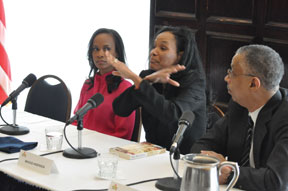
 NNPA luncheon focuses on Black economics, growing income gap
NNPA luncheon focuses on Black economics, growing income gap
Maggie Anderson talks about buying exclusively Black.
By James Wright Washington Informer
WASHINGTON, DC – The economic status of African-Americans and the “crisis-level” income gap between the rich and the poor was the agenda of this year’s State of the Black Press luncheon last week at the National Press Club in D.C.
The event, sponsored by the National Newspaper Publishers Association (NNPA) Foundation, featured discourse amongst journalists and financial experts about the different factors affecting Black economics, including the crippling recession that some said wiped out gains made by middle-class Blacks during the recent recession. “The recession supposedly ended in 2009 but there are still adverse effects,” said economist Valerie Wilson, who works with the D.C.-based Economic Policy Institute. “At the rate of recovery that is taking place we will not reach pre-recession employment levels possibly until 2018.”
Wilson took part in the panel, “Access to Economic Opportunity,” which was moderated by NNPA News Service Editor-in-Chief George E. Curry. Author Maggie Anderson and William Spriggs, former Assistant Secretary of Labor in the Obama Ad-ministration and chairman of Howard University’s economics department, also sat on the panel.
Spriggs said that income inequality is fast becoming an unfortunate fact of life.
“The collapse of the economy in the late-2000s affected the lower 99 percent of the population but the 1 percent still did well,” he said. “The top 500 [Standard & Poor] corporations got 30 percent of the income while the middle class is increasingly on a down escalator. The growing income inequality is at a crisis level.”
Spriggs said that income inequality started when President Reagan claimed that middle- and low-income Americans were hampering the economic growth of the country.
“Reagan told the 80 percent at the top of the economic ladder that they were being hurt by the 20 percent on the bottom because of the government,” he said. “That is an example of class warfare and there are some people now trying to recreate that Reagan moment.”
Anderson, who received national attention in 2009 when she and her family decided to live for a year solely on products and services provided by Black businesses, wrote a book, Our Black Year, which chronicled the struggle for Black businesses in the Chicago metropolitan area despite its huge Black population and spending power.
“There was only one Black grocery store in all of Chicago and it was very nice,” she said. “It only lasted eight months.”
Anderson managed to buy gas from a Black-owned Citgo service station that was miles away from her home and frequently bought produce from Black farmers in Chicago’s Austin neighborhood. She said the experience taught her that Black businesses do not engage Black consumers enough and the services of Black professionals must be used.
“In order to find a Black business, one should go to their area Black Chamber of Commerce and Urban League,” she said.
Ron Busby, president of the U.S. Black Chambers Inc., said that sometimes Black businesses do not want to be identified as such, which he said is a mistake.
“There is a stigma about Black businesses not being good enough to provide quality services and products and that is not true,” Busby said. “Businesses should be proud to be Black.”


Be the first to comment